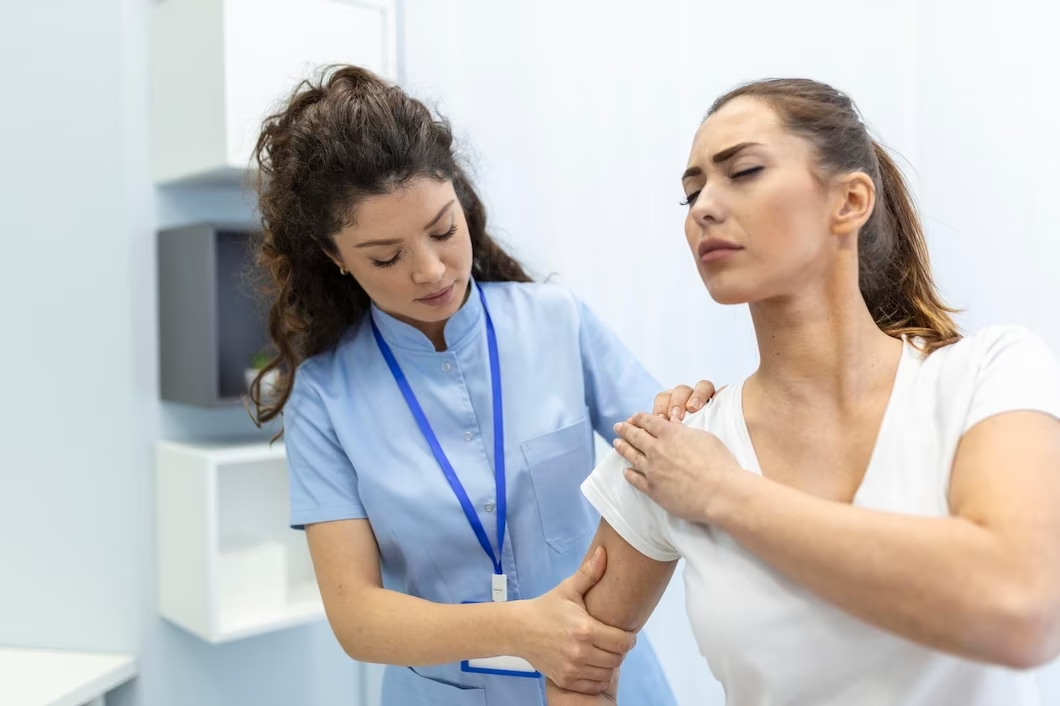Rotator cuff tears are a common cause of shoulder pain and functional impairment. When a moderate-sized rotator cuff tear is diagnosed, choosing the appropriate treatment option is crucial for optimal recovery. In this article we will explore various treatment options available for individuals with moderate-sized rotator cuff tears.
Non-Surgical Treatments
Non-surgical treatments are often the first line of management for moderate-sized rotator cuff tears. These conservative approaches aim to relieve pain, improve function, and promote healing without resorting to surgical intervention. Some common non-surgical treatment options include:
(a) Physical Therapy: A structured physical therapy program can help strengthen the muscles around the shoulder joint, improve range of motion, and alleviate pain. Therapeutic exercises are designed to restore shoulder stability and functionality.
(b) Medications: Nonsteroidal anti-inflammatory drugs (NSAIDs) may be prescribed to reduce pain and inflammation. In some cases, corticosteroid injections may be administered directly into the shoulder joint to provide short-term pain relief.
(c) Rest and Modification of Activities: Avoiding activities that exacerbate pain and modifying movements that strain the shoulder can allow the tear to heal naturally. Resting the affected shoulder and using it cautiously during daily activities can promote recovery.
Surgical Treatments
Surgical intervention is considered when non-surgical treatments fail to provide adequate relief or when the tear is significantly impacting daily activities. The two primary surgical options for moderate-sized rotator cuff tears are:
(a) Arthroscopic Repair: Arthroscopic surgery involves using a small camera and specialized instruments inserted through small incisions to repair the torn tendon. The surgeon sutures the torn edges of the rotator cuff back together, reattaching them to the bone.
(b) Open Repair: In some cases, an open surgical approach may be necessary, especially for larger or more complex tears. This involves a larger incision to directly access the torn rotator cuff tendon and repair it with sutures.
Post-Surgical Rehabilitation
Following surgical repair, a comprehensive rehabilitation program is crucial to optimize recovery and restore shoulder function. The rehabilitation process typically involves:
(a) Immobilization and Protection: Initially, the shoulder may be immobilized with a sling or brace to protect the repair. The duration of immobilization varies depending on the surgeon’s preference and the extent of the tear.
(b) Physical Therapy: Gradual physical therapy is initiated to restore range of motion, strengthen the rotator cuff muscles, and improve shoulder stability. The exercises are tailored to the individual’s specific needs and progress as healing occurs.
(c) Gradual Return to Activities: As the shoulder strength and function improve, the physical therapist will guide the individual through a progressive return to activities and sports, ensuring a safe and successful transition.
When faced with a moderate-sized rotator cuff tear, the choice of treatment depends on the severity of symptoms, the individual’s functional goals, and the surgeon’s expertise. Non-surgical treatments are usually attempted first, but surgery may be necessary for optimal recovery. Post-operative rehabilitation is essential for successful outcomes.
SEE ALSO: Small Rotator Cuff Tears Treatment Options
Looking for a shoulder injury treatment in Ahmedabad?
If you’re searching for a highly skilled shoulder surgeon in Ahmedabad, look no further than Dr. Vijay Bang. With extensive experience and expertise, he is a renowned shoulder specialist in Ahmedabad, dedicated to providing top-notch care and optimal outcomes for every patient. Contact us!


